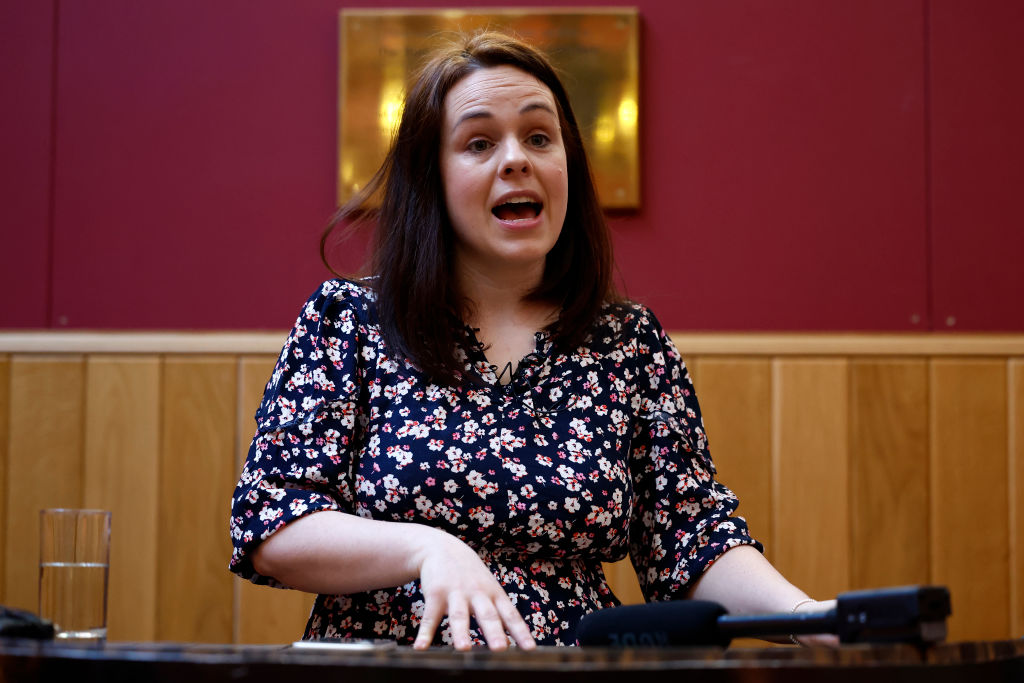Kate Forbes has made her case. She handily won last night’s STV debate between contenders for Nicola Sturgeon’s job. She spoke past the contest, which will be decided by SNP members, to the country at large, that latter constituency having been forgotten in the process to chose the next first minister. She brought the conversation back time and again to the need to listen to those who don’t support independence and to govern Scotland’s public services competently. If you want to ask people to put you in charge of an independent country, Forbes’s argument runs, you’ll have to show them you can run a devolved one first.
The average party member could come home to find Sturgeon throttling their labradoodle and they’d quickly conclude that Mr Floofball had it coming
This is an extremely risky strategy. The grassroots of the SNP worship Sturgeon. The average party member could come home to find her throttling their labradoodle with a piano wire and they’d quickly conclude that Mr Floofball had it coming. So going up against her handpicked successor, Humza Yousaf, had already put Forbes at a disadvantage. But the implicit message of her focus on competence and persuasion is that Sturgeon wasn’t up to much on either front. Factually, she’s on solid ground but this is the SNP: facts don’t come into it.
There is a section of the membership — we don’t know how large — who will vote for Yousaf because he is the establishment candidate, Nicola 2.0, the Doctor’s assistant regenerated as the Doctor. It’s hard to see what Forbes could do to win these electors, or for that matter what Yousaf would have to do to lose them. Her best hope is that enough members recognise her candidacy as the golden opportunity that it is.
Forbes sketched out that opportunity last night. Consider her opening statement:
‘It’s time for change. Continuity won’t cut it. Tonight I offer a new start for Scotland, a radical new vision based on the massive potential of this nation. To be both prosperous and socially just. That means candour about our challenges but it also means competence to fix them. I want to eradicate poverty, tackle the cost-of-living crisis and reform our NHS, and I’ll do it by building a world-leading green economy capable of driving growth for generations to come.
‘More of the same is not a manifesto, it’s an acceptance of mediocrity. We can do better and my government will focus on the people’s priorities. I can reach across the political divide and turn a divided nation into a settled majority for Yes, by motivating and inspiring the whole Yes movement but also reaching out to those who are not yet convinced. It’s time for a new generation to lead and I’m ready and able to lead that new generation.’
This is how a first minister talks. In tone and tenor, it’s something we haven’t heard for many years in Scotland: grace, nuance, seriousness, and moderation. It doesn’t negate the importance of party or dilute the principles of policy; it places them in the larger context of a country evenly divided over the constitution and at a loss over public services even more crisis-wracked than they were when the SNP took over 16 years ago. This was a pitch to lead not only a political party but a great and disputatious country.
Much commentary has focused on Forbes’s sharp putdowns of Yousaf and his lacklustre performance in every ministerial job he’s ever held, but the strength of her performance lay in the non-pithy, in the sober and substantial rhetoric that is the bread of statecraft and the butter of leadership. Yousaf sought to excuse his poor performance with reference to worse performance in England, a tactic that has carried Sturgeon through eight empty years in Bute House. ‘A first minister should have higher ambitions than the rest of the UK,’ Forbes told him and, by implication, the woman whose tribute act he has agreed to become.
It broke cover again when Yousaf, whose demeanour teetered on the fine line between confidence and arrogance, scolded her for not agreeing to take the UK government to court over its decision to block the Gender Recognition Reform Bill. He suggested she was insufficiently committed to defending devolution.
‘My job isn’t just to defend devolution’ she corrected him. ‘It’s to use devolution to serve the people of Scotland.’ The difference between them was that ‘unlike you, I’m not spoiling for a fight’.
But nowhere was Forbes more first ministerial than when, as her rivals set out their plans for commissions and campaigns to get independence, she told them: ‘We’ll get independence when we persuade a majority of Scots to vote for independence.’
Kate Forbes’s pitch is that she can grow support for the SNP and independence beyond what even Nicola Sturgeon could achieve. If she’s right, that presents party members with a landmark opportunity. Will they take it?







Comments